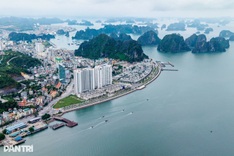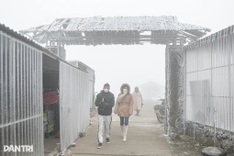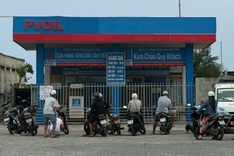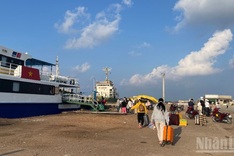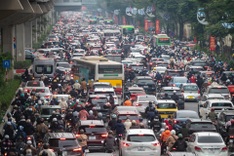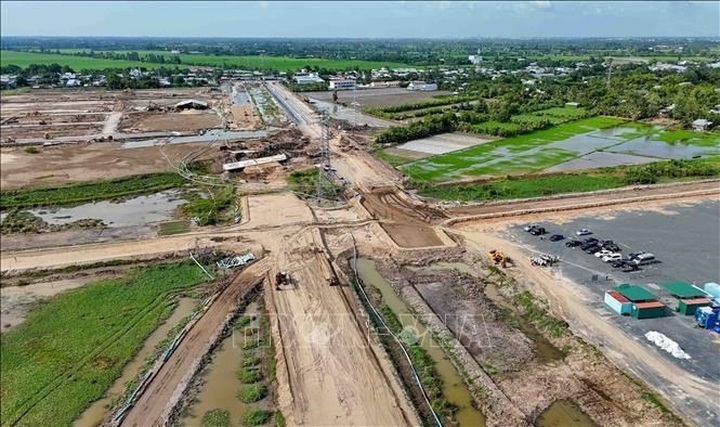
Infrastructure development at an industrial park. (Photo: VNA)
Vietnam's industrial real estate market is undergoing significant transformation as global companies adjust their investment strategies in response to shifting supply chains, rising cost pressure, and heightened sustainability requirements.
The recent influx of foreign direct investment (FDI) into the country’s industrial sector offers both a timely opportunity and a major test for Vietnam’s path toward sustainable development.
According to the “Global Occupier Markets Spotlight 2025” report by Savills, more than 80 per cent of tenants across 54 major global industrial markets have delayed new leasing decisions due to growing concerns about economic and political risks. In the Asia-Pacific region alone, around 40% of businesses are suspending or revising their industrial real estate investment plans.
This caution stems from a mix of factors, including tariff changes, exchange rate fluctuations, and increased risks from cybersecurity threats to natural disasters disrupting logistics. Many firms are turning to more flexible leasing solutions such as shorter terms, expansion clauses, and early termination options to reduce operational and financial risks. In parallel, global manufacturing strategies are increasingly focused on market diversification to avoid overdependence on any single country. This shift favours destinations with political stability, competitive costs, and favourable geographical locations.
Vietnam, with its central position in Southeast Asia, political stability, and deep integration into global supply chains, meets most requirements of new-generation industrial tenants.
Thomas Rooney, Associate Director of Industrial Services at Savills Vietnam, said that current development trends show that the country is catching up with international demand for flexibility, efficiency, and sustainability. Changes in global supply chain strategies will bring opportunities to attract new FDI flows and enhance Vietnam’s role in the international production and logistics landscape.
Data from the National Statistics Office shows that Vietnam’s industrial sector expanded by 8.07 per cent in the first half of 2025, the second highest growth since 2020. Manufacturing and processing remain the driving force, growing by 10.11 per cent. The index of industrial production (IIP) rose 9.2 per cent during the same period, reflecting a strong recovery and large-scale expansion.
These are important factors that help Vietnam strengthen investor confidence while creating a foundation for developing modern industrial centres that meet the needs of international investors, according to Savills Vietnam.
A recent report by CBRE Vietnam also highlighted continued momentum in the industrial real estate segment in the first half of 2025 despite global economic uncertainties and tariff policy shifts.
The market was buoyed by strong domestic manufacturing and a surge in FDI. While newly registered FDI reached USD 21.52 billion, up 32.6 per cent year-on-year, the disbursed capital hit USD 11.72 billion, a five-year high.
Despite the optimistic moves, Vietnam's industrial real estate market still faces notable challenges. For example, supply outside key industrial zones remains limited in both scale and quality; supporting logistics infrastructure is uneven, which affects supply chain efficiency. Moreover, global investors are increasingly prioritising environmental, social, and governance (ESG) criteria and renewable energy integration – areas where Vietnam is still grappling with. Green industrial park development remains constrained by high upfront costs and fragmented policy support.
Rooney emphasised that it's now a pivotal moment for Vietnam to shift from quantitative to qualitative growth. Integrating ESG principles into industrial infrastructure can strengthen Vietnam’s competitive edge while promoting long-term sustainability. To meet rising requirements of international investors, the country must accelerate administrative reforms, invest in interregional infrastructure, and promote green industrial zones.
Developers are encouraged to focus on flexible ready-built factory models, energy-saving solutions, and tenant-friendly lease terms. Maintaining Vietnam’s appeal to industrial investors will depend not only on current advantages but also on forward-looking strategies that benefit both public and private sectors and sustain industrial growth momentum amid global volatility.






